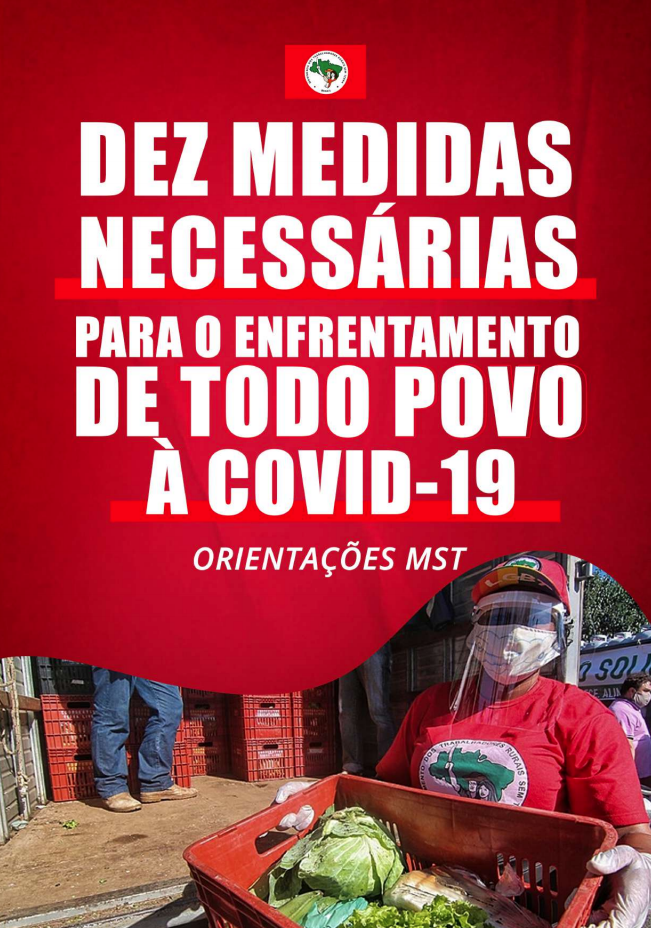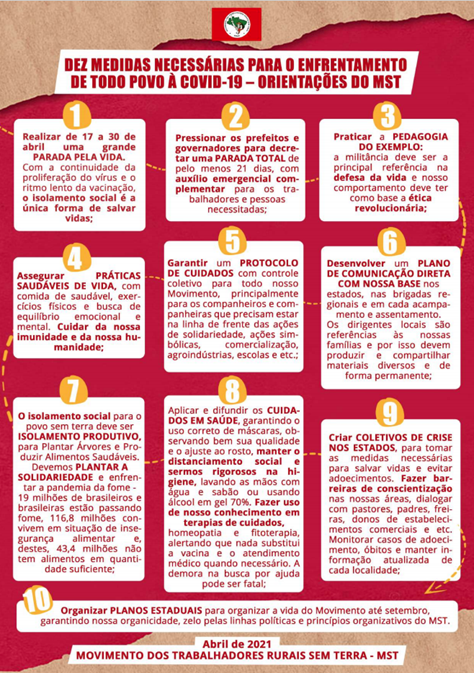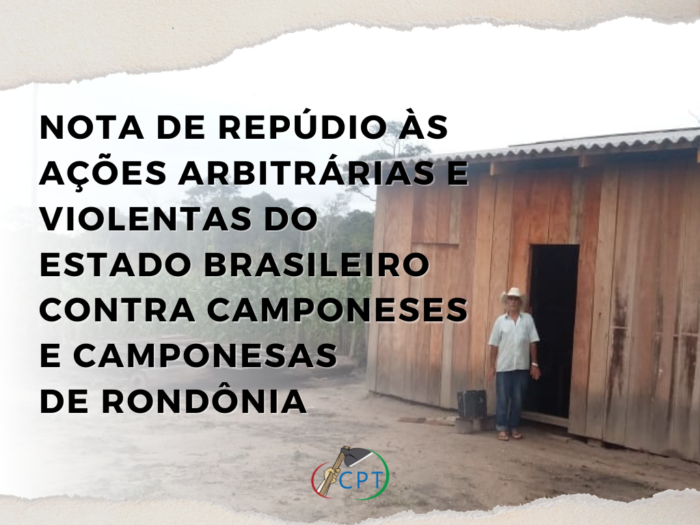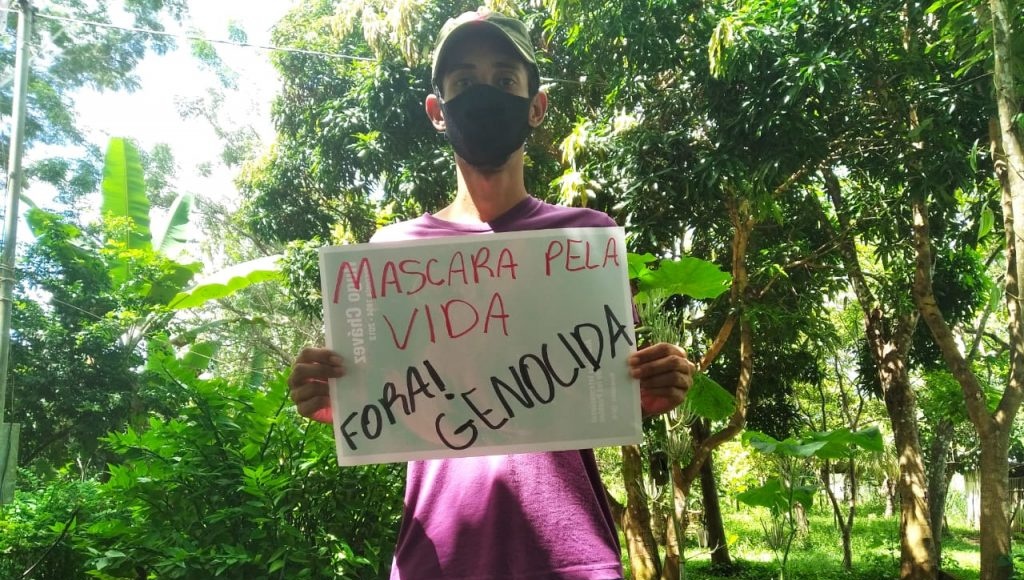Brazil is going through one of the worst crises in its history. The coronavirus epidemic has caused over 400,000 deaths officially recorded so far across the country, with no end in sight. Deaths that could have been avoided, according to a recent article from the MST, the Movimento sem Terra, Brazil’s landless movement, if the federal government had been serious in adopting social distancing, mask-wearing, investment in the SUS national health service, and continued the emergency payments of R$ 600 (£80) a month instead of reducing it to R$ 150 a R$ 350 (£20 to £46). The article accuses Bolsonaro of genocide of the Brazilian population by his refusal to adopt national measures.
For over a year, the MST has been proactive in advising its members, and small farmers in general, about how to stay safe when selling produce in public markets and spaces . It has asked Brazil’s Supreme Court to remove the Bolsonaro government for disrupting those governors, mayors and members of society who have sought to save lives. The MST is among over 30 social movements that have jointly called upon the federal government to urgently supply intubation kits and oxygen. Many well-known singers and actors also support the MST’s call for agrarian reform, including Caetano Veloso who has visited its encampments and denounced Bolsonaro’s incompetent response to the pandemic.
A shutdown for Life
To counter the federal government’s gross negligence, the MST organised a “Parada pela Vida”, a Shutdown for Life, from 17 to 30 of April in MST-organised areas and land. The shutdown is not the same as the urban lockdowns: the settlers continue to produce food on nearby land and raise awareness of Covid-19 precautions. For example, families at the Luzinei Barreto settlement in Ouro Preto D’oeste, Rondônia, have been socially isolating at home and also farming their plots while avoiding other parts of the settlement and social areas – all part of a community-wide understanding of what needs to be done to fight Covid-19.
Video: MST YouTube video
Settlement member Fred says ‘The Parada’s been fundamental to guarantee the health of our people, because Coronavirus is getting closer to this area and it’s absolutely essential to slow it down, cutting the number of infections and thus the numbers of hospitalisations and deaths.
‘Organising this Parada [shutdown] is absolutely vital at this stage of the pandemic… the families living here are being trained to practice ‘productive isolation’ at home and in the workplace; to continue producing in the fields, but without moving around the settlement and without gathering together in the communal spaces such as churches, football pitches and bars. All these social places where people gather together are being restricted at present.’
The MST’s thinking behind the Parada pela Vida is that being safe against Covid-19 is not just a question of individual behaviour. It must also be part of a collective commitment by the movement not only to save lives, but also to prevent the increasingly frequent long-Covid that affects many survivors of the virus. To this end, the MST created a protocol to which everyone should adhere to during the Parada.

The aim of the Parada and its protocol is to maintain social isolation as the only way to save lives, by avoiding crowds and suspending events such as parties, dances, excursions to rivers and waterfalls, football matches, and social sports. Among the protocol’s ten measures are not just the use of face masks, social distancing and constant hand hygiene, but also political ones such as pressing mayors and state governors to enact a total shutdown of at least 21 days, with complementary emergency assistance for workers and people in need.

One measure emphasizes that social isolation must be productive isolation through the planting of trees and production of healthy food, so as to sow solidarity and face the hunger pandemic – 19 million Brazilians are starving, 116.8 million live with food insecurity of whom 43.4 million do not have enough food.
Another measure asks activists to create crisis collectives to take the necessary measures to save lives and avoid becoming ill – via awareness and dialogue with pastors, priests, nuns, owners of commercial establishments, etc., to monitor cases of illness and deaths, and to keep information updated in each MST locality.
Remembering the massacre at Eldorado
The MST sees the Parada Pela Vida as part of an important moment in its history, as 2021 is the 25th anniversary of the infamous massacre of Eldorado do Carajás when nineteen landless farmers occupying private land in Pará state were killed by police during a demonstration on a public highway. Although the two police commanders were finally jailed 16 years later in 2012, violence and killings against rural and landless workers are still common, as denounced in a public statement issued on 12 April by the Comissão Pastoral da Terra (CPT), the Pastoral Land Commission founded in 1975 by the Catholic church’s National Conference of Bishops of Brazil (CNBB).

The CPT statement was signed by 57 secular and church organisations that campaign across Brazil’s Amazon basin for human and civil rights. It denounced arbitrary actions of the Brazilian authorities against small farmers in Rondônia, a state in southern Amazonia that has rapidly become a major producer of agricultural cash crops and beef.
A pandemic of evictions
Rondônia, like Pará state, has seen many cases of violence against small producers. In 2020, in the midst of the pandemic, over 700 families were evicted, around half of the total number occupying lands across the whole of Amazônia. In 2021, more than 200 families were evicted from the Nova Floresta settlement project in Campo Novo de Rondônia, among whom 19 rural workers and family members were reported to be ill with the coronavirus. In addition, 70 families are facing impending forced eviction from the Fazenda Vilhena do Pensamento, near Vilhena, in southern Rondônia not far from its border with Mato Grosso state.
The CPT statement denounces the involvement of private gunmen and state police in such evictions, the efforts of the state governor against calls from other public bodies to delay evictions during the pandemic, and night raids and psychological pressure from police, including the Environmental Police of Mato Grosso who do not hesitate to impose environmental legislation on small family farmers, while their rivers, fauna and flora suffer from deforestation and poisoning caused by the expansion of agribusiness.
The signatories of the CPT statement repudiate the Brazilian state’s action in dismantling public agrarian and environmental policies and in promoting land reforms that favour large landowners and agribusiness companies. The signatories demand that state and federal authorities guarantee the right to democratization of the lands of evicted and vulnerable families and call upon the judiciary to implement Recommendation No. 90 of the National Council of Justice (CNJ) for caution in the deciding evictions during the Covid-19 pandemic.
The CPT statement ends with a call to support the struggle of rural families who need a piece of land to live and survive.

